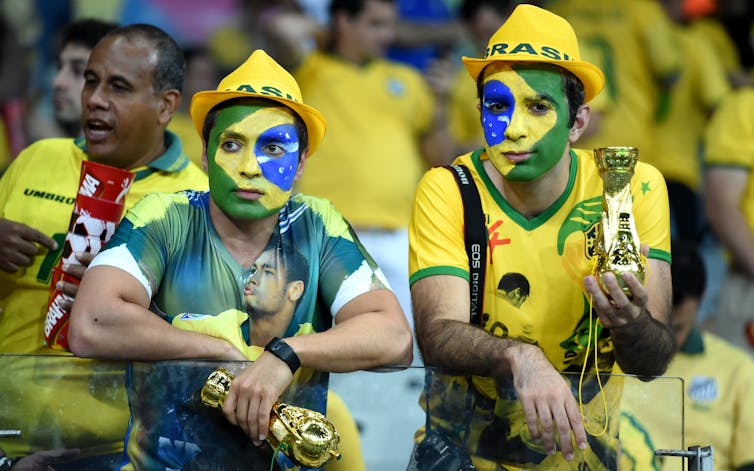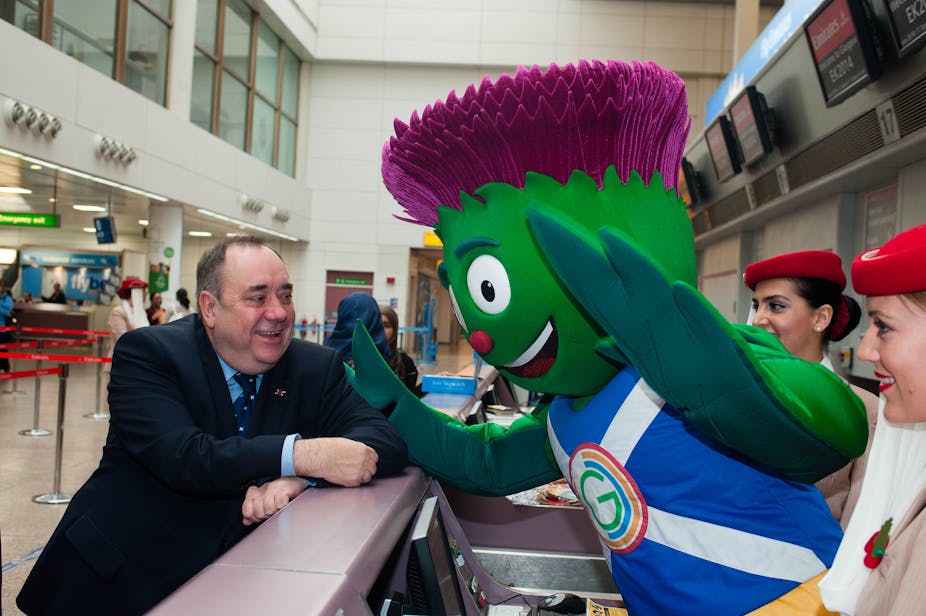Celtic Park is hosting one of the biggest spectacles in the sporting calendar. The 40,000 spectators will be treated to the vagaries of the sports-media-entertainment complex: Rod Stewart, Susan Boyle and Amy Macdonald are due to perform while a 1020m2 mega-screen, Glasgow’s “Window on the Commonwealth,” will create a dramatic and immersive visual experience at the south stand.
With an estimated live global television audience of one billion, the ceremony will provide the city with an opportunity to strategically position itself in relation to the Commonwealth and stress the “generosity of spirit” tag-line that runs through the Glasgow narrative. Yet even though such events usually focus on the host city, there appears to be no shying away from the opportunity to also display the nation (or selected versions of it).
As Eileen Gallagher, independent director of the Glasgow 2014 board and chair of the ceremonies, culture and Queen’s Baton relay explained: “Our bold and creative vision [is] to showcase our host city and nation”.
She added: “We are not in any way shy about being as Scottish and as Glasgow as we should be, because this is a big, big opportunity. I want people to look at the images we show … and say, ‘I want to be there. I want to go to Glasgow. I want to go to Scotland’.”
These sorts of pictures are often mythical, inclusive visions that have political capital. They are designed to attract tourists, drive investment and promote some form of feel-good factor, a sense of pride, a sense of attachment and a sense of belonging to nation.
Vote for Team Scotland!
Arguably this could not come at a better time for some. For while sport maintains a sense of distance from politics, at least publicly, and both sides in the September independence referendum campaign have been promising to return the compliment, in reality the two could not be more interconnected.
So what impact are the games likely to have? Perhaps none. It is probably rather reductive to reduce the complexities of independence to athletic performance or one major event. The spectacle of the opening ceremony and medal-winning performances (or failures) are probably not reason enough to persuade voters. To say otherwise rather trivialises the intelligence of those voting.
Yet sporting events might provide one of the most powerful manifestations for the performance of Scottishness —- especially in such a global age. Scotland is arguably emblematic of what the late Eric Hobsbawn might suggest as a nation through which sport is so uniquely an effective medium for inculcating national feelings.
Brazil’s bum trip
There are similarities here, albeit differing contexts, between the Commonwealth Games and this year’s World Cup. The national identity of Brazil, like Scotland, is bound with its sporting identity. And look what happened to Brazil when national performance did not live up to expectation. The mood turned following injury to Neymar and more markedly following humiliation at the hands of the Germans.

Dissonance, mourning and disbelief starkly contrasted with the feel-good factor; deep inequalities and economic disparities resurfaced following a brief pause. Here, sporting success mattered, with performance and levels of patriotism clearly linked. So for the yes campaign, no matter how unfairly, performance could matter. Failure, no matter how defined, could alter the mood.
Then there is the English dimension. If England dominate in Glasgow, would there be the potential for an inverse relation between success and feelings of Scottishness? Might English success manifest in some form of Scottish backlash that could benefit the yes campaign?
As for the broader spectacle, it is likely that the games may well deliver a euphoric high, no matter how ephemeral. Scots may experience intense feelings of patriotism, in a moment of what is somtimes termed “hot nationalism”. It can gloss over the realities of everyday life and the complex intricacies of the referendum.
One only has to think of the euphoria that circulated around London 2012, the version of Britishness on show at the opening ceremony, and the celebration and national pride demonstrated on Super Saturday. Indeed, with the Commonwealth Games exuding Britishness through all its sinews, one might question how Scottish the games can be.
Yet there is little to suggest that there would be long-lasting effects. These temporary moments of attachment, belonging and patriotism are often fleeting. Any euphoric hot nationalist attachment to some form of a mythical or manufactured Scottishness is likely to quickly dissipate. In the end, it is likely to make little difference to the independence referendum.

